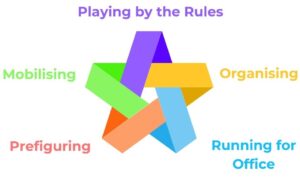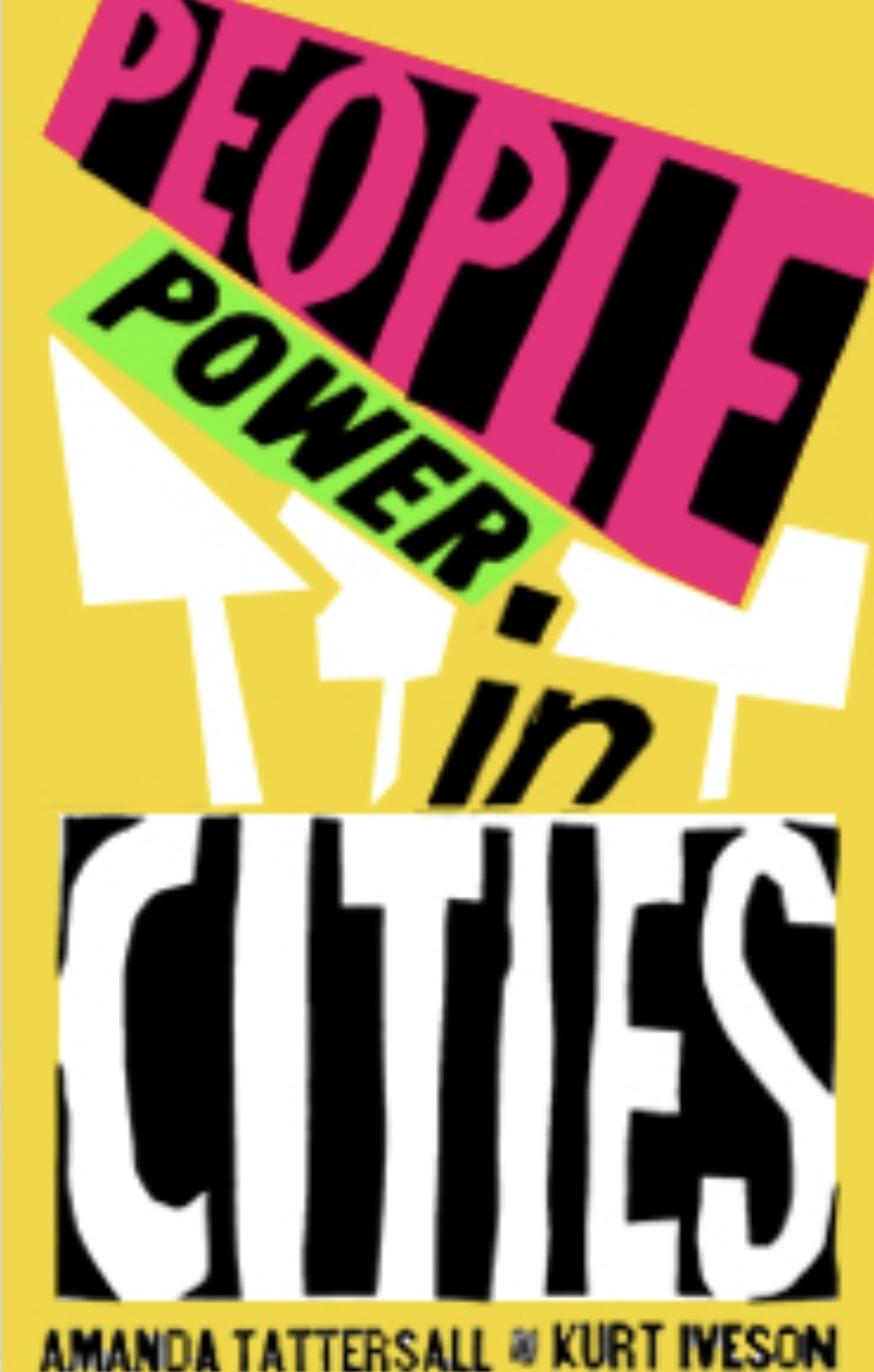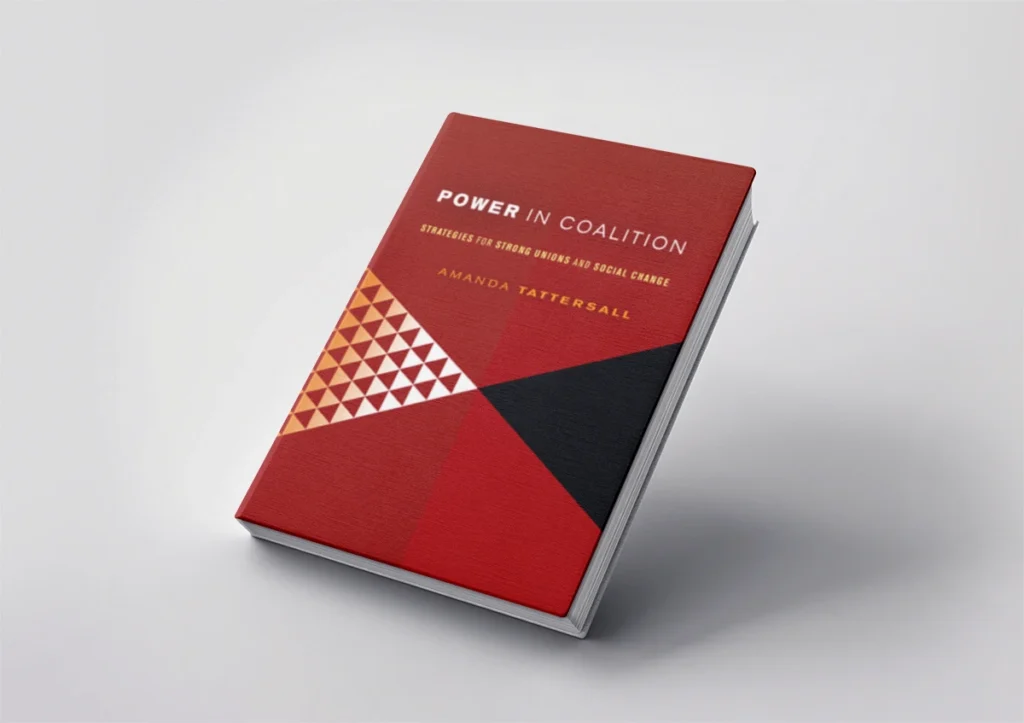Books
People Power in Cities – Release late 2025/early 2026
People Power in Cities by Amanda Tattersall and Kurt Iveson travels to cities around the world in search of strategies that people are using to to fight for social and climate justice, and to achieve a greater say in how their cities are run.
30 sec summary: People Power in Cities – Oxford University Press by Amanda Tattersall & Kurt Iveson
In the age of inequality and climate crisis, what does it take for people to change their city for good? This is the challenge facing the residents of cities across the world.
People Power in Cities travels to cities around the world in search of strategies that people are using to to fight for social and climate justice, and to achieve a greater say in how their cities are run.
In doing so, it explores a new way of thinking about people power, one that can unlock opportunities everywhere for urban movements that are urgently seeking to create change.
Key finding: Five People Power Strategies faced by movements and organisations
The central finding of People Power in Cities is the identification of five different forms of people power that are common strategies used to make change in cities:

- Playing by the rules: is a strategy of involving people using the formal mechanisms of consultation, representation and litigation available in liberal democratic states. This could include lobbying politicians, encouraging people to vote in a particular way, using market levers to shift corporate behaviour or launching legal action.
- Mobilising: is a strategy that seeks to build power by bringing together people committed to a cause into contentious public action to demonstrate dissent or create moral pressure.
- Organising: is a strategy that focuses on building the power of groups and coalitions, by engaging individuals and developing leadership capacities across and between diverse constituencies.
- Prefiguring: is a strategy of community experimentation where people seek to ‘model’ or ‘prefigure’ what they would like to happen in smaller experiments, such as community energy hubs that model alternative models of energy creation and distribution.
- Running for Office: is a strategy where people run for office as political parties, independents or platforms with the goal of using the power and resources of the state to make change.
Sneak peak – already published writing and listening about our findings in People Power in Cities
People Power in Cities brings together seven years of research. For those of you interested in what we have found – but can’t wait to read it in book form – here are some already published pieces that cover some of the themes:
- What do we mean by People Power? This BLOG is a short introduction to the five people power strategies we explore in the book.
- The case studies we explored: I recorded podcasts with many of the case studies we document in the book:
- Prefiguration and Cape Town – Reclaim the City is a Black working class housing movement fighting for inner city affordable housing to deliver spacial justice in the city – ChangeMakers episode here. We also have an open access academic article about prefiguration as strategy (including a case study of Reclaim the City) – here. A short article on the powr of prefigurative strategy in times of dictatorship and authoritarianism is here.
- Running for Office and Barcelona – following the 2008 Great Recession and the resulting housing crisis , activists turned to organising, mobilsing and then ran for office establishing a new political platform called Barcelona en Comu and ran for office in the City Council – with their party Barcelona en Comú winning the Mayoralty for two terms -you can listen to a ChangeMakers episode hosted by Amanda here, and a Conversation article here.
- Mobilising and Hong Kong – I wrote a series of four articles for the Conversation about the anti-Extradition Bill Movement in 2019 based on my time researching the movement in Hong Kong during the heights of the protest and interviews with a range of protest organisers and participants. A link to all the articles are here, the first is here. I also did podcasts about the Umbrella Movement, and two on the history of the 2019 Protests, one of the history of protest in Hong Kong, and one on the period between Umbrella and 2019.
- Organising and Sydney – I don’t have a podcast with the Sydney Alliance leaders we studied, but there is a memoir first published in the Griffith Review that includes the story of how I helped set it up, which can be read here or listened to here. I have also recorded a series of podcasts about community organising with some of the world’s leading organisers – these are all listed here. There is a peer-reviewed article about the history of the Sydney Alliance here.
- People power and housing: We have written about how these strategies have been used in housing movements around the world here.
- People power strategies and forms of leadership development in movements and organisations: We have explored how different strategies support leadership development in activists and communities in different ways in relation to the Student Strikes for Climate movement in Australia, here.
- What people power strategies means for organising? Both Kurt and I consider ourselves organisers, and we have written about what it means to ‘think ecologically’ while being committed to a particular people power disposition. For organising – we think that means throwing off some of the ‘swagger’ and ‘silver bullet thinking that can come from the tradition. Read more in this article in this open access article in the first edition of the Community Organising Journal – Organizing is Not a Silver Bullet.
- What does it means for thinking about organising and mobilising? The book makes the argument that different strategies – like mobilising and organising – can productively cohabitate, even if they are not working in coalition. Read more about this relationship in a piece in the Stanford Social Innovation Review.
Introducing People Power in Cities
The world’s cities are in a state of upheaval. Most are beset by dramatic population fluctuations, alongside escalating crises on issues such as housing, transport, healthcare, policing, inequality, pollution and climate change. When city dwellers seek to solve these crises, they are confronted with formidable obstacles – not least state and market actors whose power and influence over the city can feel overwhelming. This is true even in self-described democratic cities, but it takes on a sinister edge in more authoritarian contexts, where even basic political rights like the vote or free speech cannot be taken for granted.
People Power in Cities is a book for readers who are restless in the city and unsatisfied by urban spaces dominated by undemocratic forces and structural inequalities of class, race, gender and beyond. The book is aimed at a global audience of change makers and academics who want to know more about the concrete strategies that can be used to make more democratic, just and sustainable cities. It addresses the need for inspiration about what is possible in difficult times, and for clear, grounded analysis of the strengths and limitations of different strategies that are available to people trying to realise those possibilities.
This book is written by two people who have repeatedly moved between the rapid pace of active involvement in trying to make change in their city, and the slower scholarly reflection of examining what works and what does not. Associate Professor Tattersall has a longer history in social action, and Associate Professor Iveson has spent considerable time as a scholar. We met in the process of introducing a new form of people power to Sydney – community organising. We had hoped it would solve weaknesses found in our previous social change work in mass-based demonstrations around the War in Iraq, union organising, youth advocacy, and in progressive political parties. We discovered that it too, had strengths and weaknesses: the insight was that there was no ‘silver bullet’ for building people power in Sydney. Accordingly, we began a five-year journey, reaching out to hundreds of activists and leaders from across the world who were also interested in how they could change their cities for the better, and remake their societies in the process. Dozens of field trips and exchanges across every continent slowly uncovered valuable lessons.
Around the world, there is evidence of urban movements and organisations asserting their ‘right to the city’ in the face of crises and constraints. Just as so-called ‘people power’ movements have risen up to transform undemocratic nation states, so too have urban movements arisen to challenge the domination of their cities. When these urban movements are determined both to advance solutions to a range of urban crises, to build powerful intersectional coalitions across the diversity of urban identities, and to democratise their cities and societies in the process, they can rightly be described as urban people power movements.
People Power in Cities is about the political strategies that are at the heart of these urban people power movements, from the authors’ home city of Sydney, to cities including Hong Kong, Cape Town, Austin and Barcelona. Some of these cities have achieved global attention for their spectacular forms of urban politics such as the 2019 protests in Hong Kong and the election of former housing activist Ada Colau as Mayor of Barcelona. In surveying a range of different people power strategies, our book looks past the visible manifestations of urban movements – in protests, occupations, town hall meetings, electoral campaigns and other actions – to delve into the underlying understandings of ‘the people’ and the relationships and strategies that build their power. It makes the case that people power takes particular forms and has distinct dynamics when it tries to change the city.
The centrepiece of our book is our five people power strategies. The early chapters introduce readers to the five key people power strategies that are used by urban movements that are seeking to deal with immediate urban crises in their cities, and to democratise their cities in the process. Subsequent chapters illustrate these people power strategies in action, through a global survey of urban people power networks, and a series of rich and compelling stories. These are told in chapter-length case studies detailing the different forms of people power in action in Sydney, Hong Kong, Cape Town, Austin and Barcelona.
The ideas we present in People Power in Cities have been developed in dialogue with people involved in urban social movements – people who, like us, are eager to know more about the different people power strategies that have and have not worked in other places. The book has been produced directly alongside 30 experienced leaders from the cities that feature in it, all of whom examined early drafts at a two-week long gathering held in Sydney in 2019.
Our goal is a text that is accessible to change makers and students alike, while making original contributions to the academic literatures focused on social change and urbanisation in the twenty-first century.
To find out more and buy the book:

More work

Power in Coalition: Strategies for strong unions and social change
How can we change things in an age in which governments are fixated on the bottom line and…